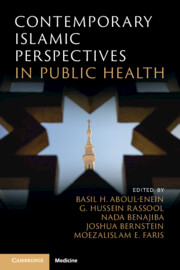Book contents
- Contemporary Islamic Perspectives in Public Health
- Reviews
- Contemporary Islamic Perspectives in Public Health
- Copyright page
- Contents
- Contributors
- About the Editors
- Acknowledgments
- Chapter 1 Introduction to Islam
- Chapter 2 The Qur’an and Prophetic Guidance: An Overview in the Context of New Public Health
- Chapter 3 Islamic Applications towards Public Health Policies: A Brief Perspective
- Chapter 4 Islamic Prayer (Salat) and Health
- Chapter 5 Perceptions of Health Behaviors and Illness in Muslims
- Chapter 6 Social Justice, Human Rights, and Equality: An Islamic Perspective
- Chapter 7 Public Health, Hygiene, and Islam
- Chapter 8 Foods of the Qur’anic Garden: An Islamic Perspective
- Chapter 9 Recommended Eating and Dietary Practices in Islam
- Chapter 10 Islamic Food Law and Dietary Restrictions
- Chapter 11 Ramadan Intermittent Fasting: A Contemporary Health Perspective
- Chapter 12 Promoting Oral Health: Influences of Hadith and Sunnah
- Chapter 13 Coping and Mental Health: Islamic Practices and Beliefs
- Chapter 14 Maternal and Child Health: An Islamic Perspective
- Chapter 15 Immunization and Islamic Guidance
- Chapter 16 Sexual and Reproductive Health: An Islamic Perspective
- Chapter 17 Zakat and Waqf: Towards Achieving Sustainability, Health, and Well-Being
- Chapter 18 Earth and the Environment: Islam and Stewardship
- Chapter 19 Sleep and Health: An Islamic Perspective
- Chapter 20 Addictive Behaviors and Public Health
- Chapter 21 Highlighting the Concepts, Principles, and Values of Communication: A Brief Islamic Perspective
- Chapter 22 Contemporary Public Health, Islam, and Positive Health
- Chapter 23 Cultural Competence in Public Health: A Brief Islamic Perspective
- Chapter 24 Muslims and Non-Muslims: Perspectives on Immigrant and Minority Health
- Chapter 25 Challenges and Solutions in Public Health: An Islamic Perspective
- Index
- References
Chapter 7 - Public Health, Hygiene, and Islam
Published online by Cambridge University Press: 02 January 2025
- Contemporary Islamic Perspectives in Public Health
- Reviews
- Contemporary Islamic Perspectives in Public Health
- Copyright page
- Contents
- Contributors
- About the Editors
- Acknowledgments
- Chapter 1 Introduction to Islam
- Chapter 2 The Qur’an and Prophetic Guidance: An Overview in the Context of New Public Health
- Chapter 3 Islamic Applications towards Public Health Policies: A Brief Perspective
- Chapter 4 Islamic Prayer (Salat) and Health
- Chapter 5 Perceptions of Health Behaviors and Illness in Muslims
- Chapter 6 Social Justice, Human Rights, and Equality: An Islamic Perspective
- Chapter 7 Public Health, Hygiene, and Islam
- Chapter 8 Foods of the Qur’anic Garden: An Islamic Perspective
- Chapter 9 Recommended Eating and Dietary Practices in Islam
- Chapter 10 Islamic Food Law and Dietary Restrictions
- Chapter 11 Ramadan Intermittent Fasting: A Contemporary Health Perspective
- Chapter 12 Promoting Oral Health: Influences of Hadith and Sunnah
- Chapter 13 Coping and Mental Health: Islamic Practices and Beliefs
- Chapter 14 Maternal and Child Health: An Islamic Perspective
- Chapter 15 Immunization and Islamic Guidance
- Chapter 16 Sexual and Reproductive Health: An Islamic Perspective
- Chapter 17 Zakat and Waqf: Towards Achieving Sustainability, Health, and Well-Being
- Chapter 18 Earth and the Environment: Islam and Stewardship
- Chapter 19 Sleep and Health: An Islamic Perspective
- Chapter 20 Addictive Behaviors and Public Health
- Chapter 21 Highlighting the Concepts, Principles, and Values of Communication: A Brief Islamic Perspective
- Chapter 22 Contemporary Public Health, Islam, and Positive Health
- Chapter 23 Cultural Competence in Public Health: A Brief Islamic Perspective
- Chapter 24 Muslims and Non-Muslims: Perspectives on Immigrant and Minority Health
- Chapter 25 Challenges and Solutions in Public Health: An Islamic Perspective
- Index
- References
Summary
Public health aims to promote and protect the health of people and communities. This is clearly adopted by Islam as a way of life. Many of the Islamic teachings and practices promote spiritual, mental, social, as well as physical health. Details of that are contained in the Holy Qur’an and the Prophetic guidance (Hadith). Many verses in the Holy Qur’an emphasize the importance of personal hygiene and a healthy lifestyle. There is emphasis on cleanliness and hygiene, as well as guidelines for how to respond to major public health threats such as epidemics and fighting infectious diseases. In this chapter, we outline how public health is portrayed in Islamic values, principles, teachings, and practices related to hygiene. Special attention will be paid to hygienic practices in Islam and their role in the primary prevention and control of infectious diseases that were so prevalent in ancient times and continue to constitute a global threat to people’s well-being as well as the role of environmental hygiene.
- Type
- Chapter
- Information
- Contemporary Islamic Perspectives in Public Health , pp. 43 - 47Publisher: Cambridge University PressPrint publication year: 2025

